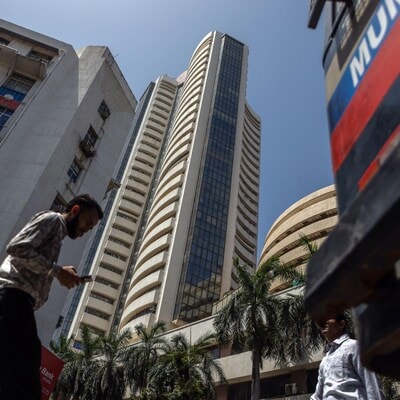)
The Bombay Stock Exchange (BSE) building in Mumbai. Photographer: Dhiraj Singh/Bloomberg
The benchmark indices on Wednesday recouped over half the losses they suffered on the Lok Sabha election results day, as the Bharatiya Janata Party (BJP)’s coalition partners reasserted their support for the next government under Prime Minister Narendra Modi.
The equity markets also benefited from bargain-hunting and short-covering following a tumultuous Tuesday. The Nifty 50 closed the session at 22,620, marking a gain of 736 points, or 3.4 per cent. This was the biggest single-day gain since February 1, 2021. The Sensex, meanwhile, ended the session at 74,382, surging by 2,303 points or 3.2 per cent. This uptick was the Sensex’s best single-day gain since the exit polls suggested that the BJP would secure a comfortable majority.
The latest rebound helped a recovery of over Rs 13.2 trillion in market capitalisation, following the worst-ever Rs 31 trillion rout seen a day earlier.
ALSO READ: BJP’s narrow victory in Lok Sabha divides brokerages; most remain positive

Market players attributed this choppiness to uncertainty surrounding the election results and government formation. They suggested the volatility would subside if there were no further negative surprises regarding the continuity of Modi as prime minister.
On Wednesday, during a National Democratic Alliance meeting, all BJP allies, including the Telugu Desam Party (TDP) and the Janata Dal (United), pledged their support for forming the new government. This helped to alleviate investor concerns about the continuity of the regime.
However, concerns about the government’s ability to enact politically challenging reform measures continue to weigh on investors’ minds. Sunil Thirumalai, executive director, GEM Equity Strategist at UBS, wrote: “While political stability should help ensure continuity in policy agenda, we see the risk of populist bias in the third term (targeted towards lower-income strata) and change in economic policy dynamics with tougher reforms getting pushed further out.”

“The 2024 election results may finally compel investors (institutional and non-institutional) to focus more on numbers and less on narratives. We would watch for any change in the stance of retail investors, who have been the major force behind the market regarding flows,” wrote Sanjeev Prasad, managing director & co-head of Kotak Institutional Equities.
All the Sensex constituents gained, with HDFC Bank, which rose 4.6 per cent, contributing the most to index gains, followed by ICICI Bank, which rose 3.3 per cent. All the sectoral indices on the BSE gained. Telecom stocks rose the most, and their index on the BSE rose 6 per cent. Overall, 2,560 stocks advanced and 1,261 stocks declined on the exchange.
First Published: Jun 05 2024 | 9:43 PM IST
Note:- (Not all news on the site expresses the point of view of the site, but we transmit this news automatically and translate it through programmatic technology on the site and not from a human editor. The content is auto-generated from a syndicated feed.))



